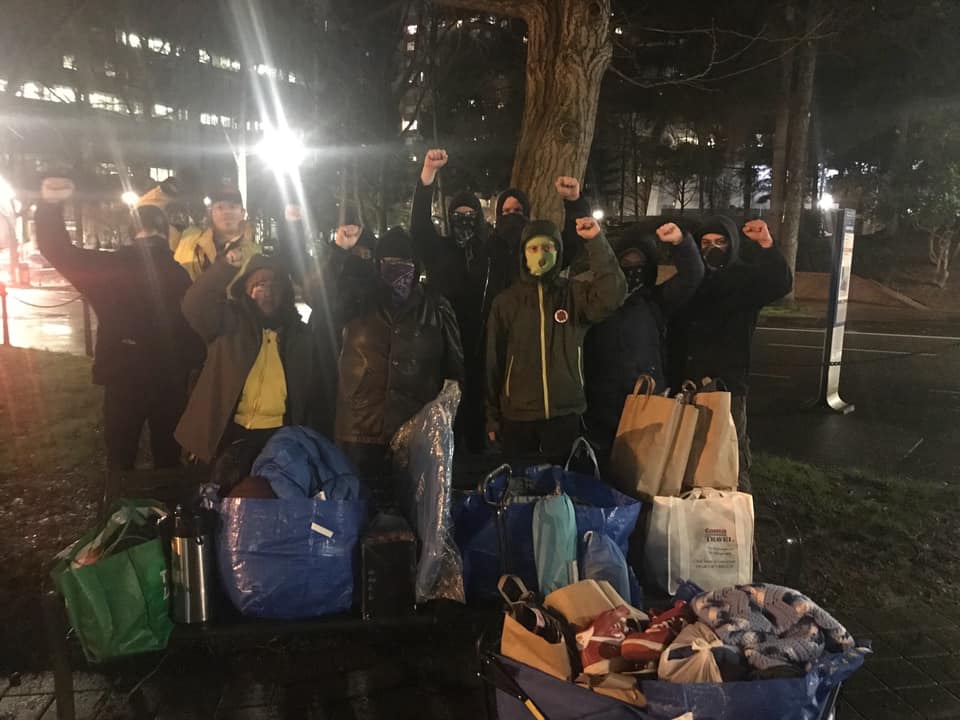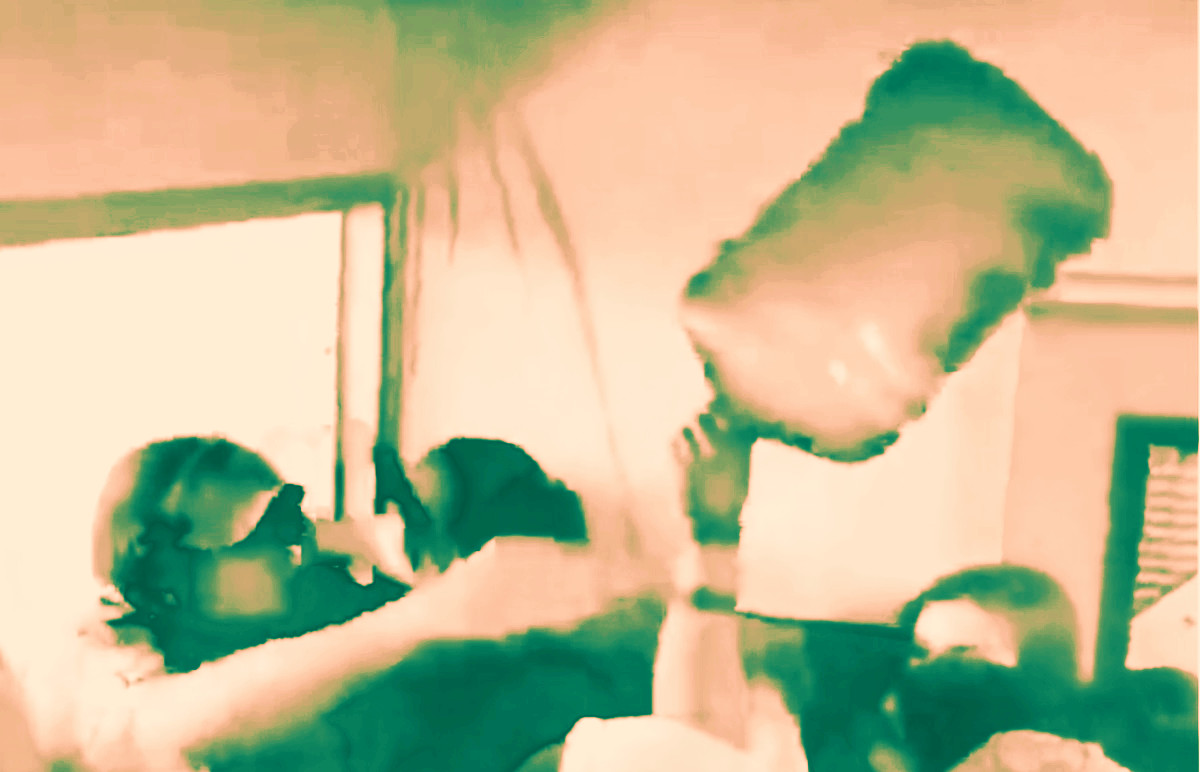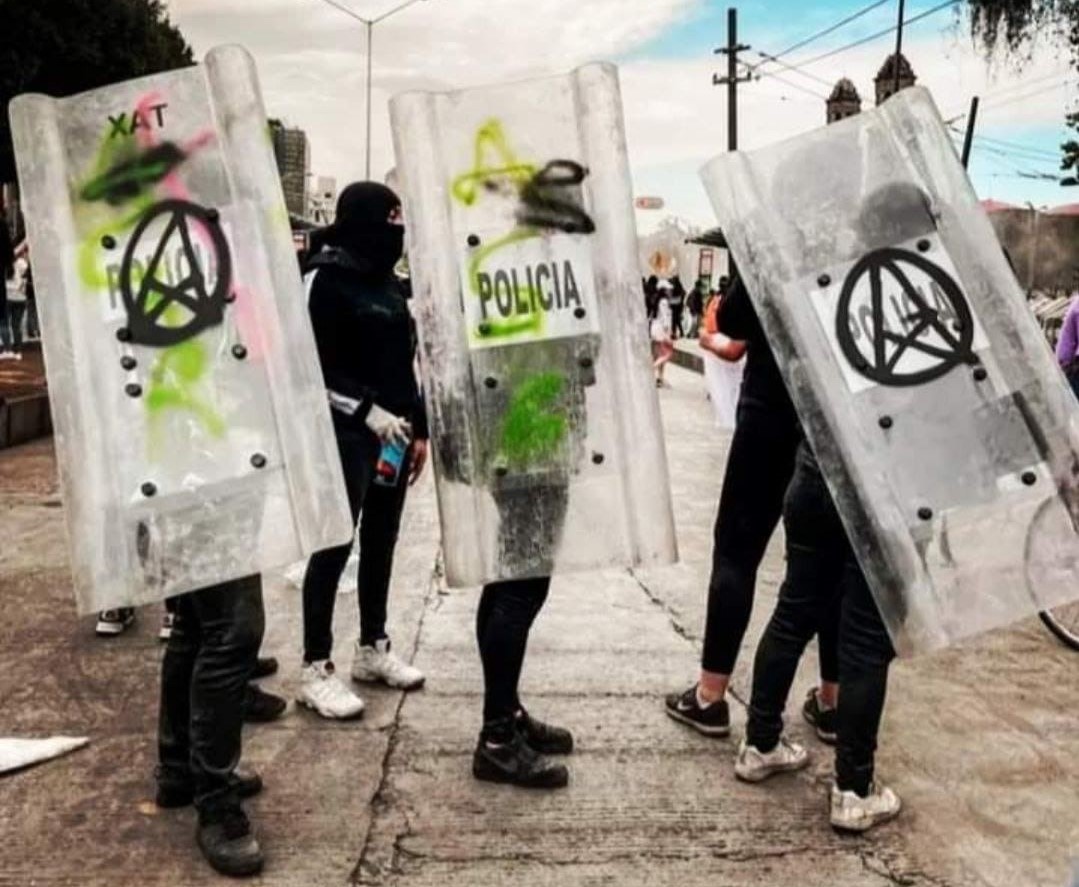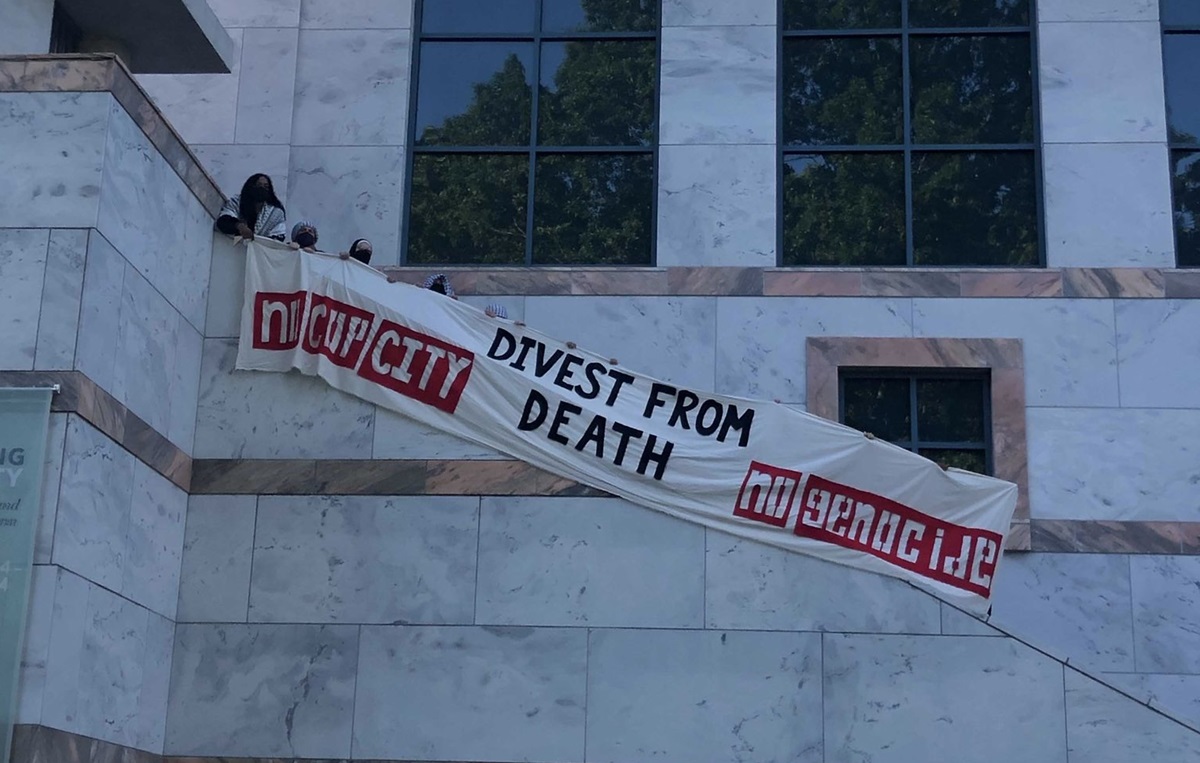Filed under: Analysis, Anarchist Movement, Austerity, Featured, Gentrification, Housing, Northwest, Repression
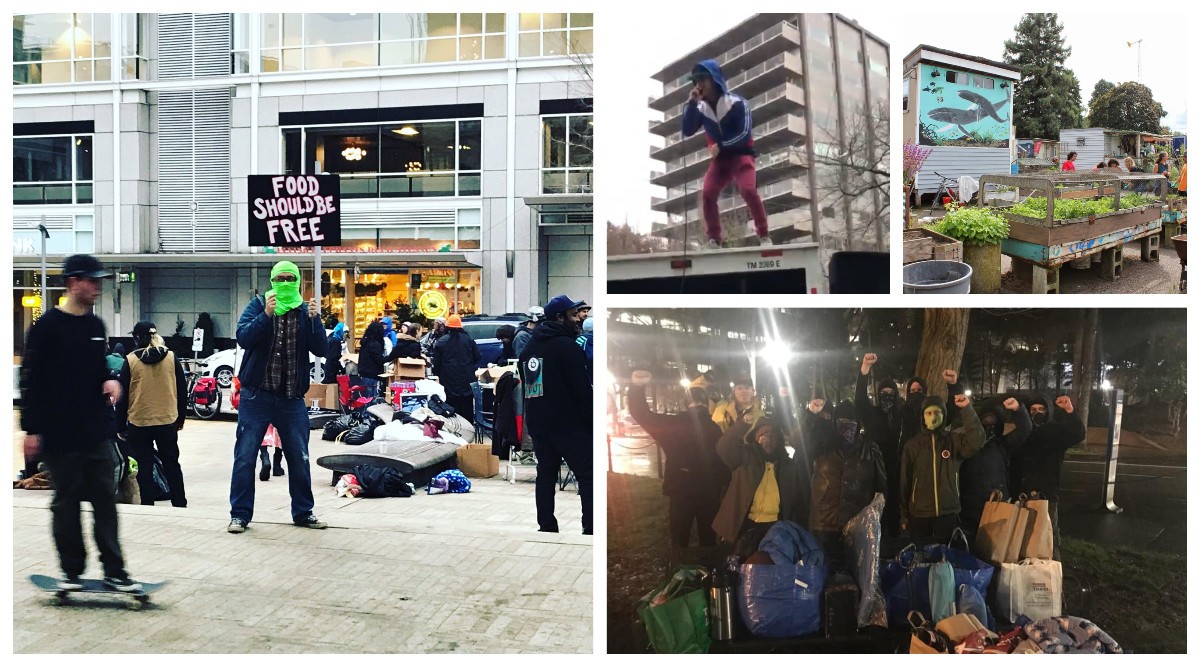
Report and analysis on recent attempts by the city of Portland to criminalize mutual aid and push out houseless people as gentrification, austerity, and rising costs drive more and more people from their homes.
On Sunday, December 8th, local anarchists and community members in Portland gathered to take direct action against the most recent policy by the city of Portland aimed at criminalizing sharing food with people without housing in city parks.
What follows is a brief outline contextualizing the city of Portland’s policy towards the houseless, along with a reportback on our recent successful action, which can only be understood within the context of decades of community struggle against the neoliberal austerity governance and gentrification in Portland, Oregon.
The Context
According to the Federal Department of Urban Housing and Development, Oregon has the second highest rate of unsheltered houseless people in the county. In 2015, then Portland Mayor Charlie Hales declared a “homeless state of emergency.”However, this “state of emergency” has only been used as a pretext to further the war on the houseless with the aim of achieving more profits for the Portland Development Commission and their capitalist ilk.
The total number of people actually sleeping outside has increased by 20% since 2017. All the while, Oregon has seen a vast redistribution of the wealth to the top tenth of one percent of the population.
Since 2015, the total number of people without housing in Portland has grown from 3,801 to 4,015 in 2019 with the total number of people actually sleeping outside increasing by 20% since 2017. All the while, Oregon has seen a vast redistribution of the wealth to the top tenth of one percent of the population. The gap between this group and median household income has increased fivefold since 1980. In the same time period we have witnessed a massive federal defunding of public housing, producing the roots of today’s housing crisis across the U.S. It’s no surprise that, instead of taking urgent action to address the needs of the houseless community, the city has continued to approve a litany of policies favoring the economic elite, represented by the likes of the Portland Business Alliance, that have ensured the continued onslaught of gentrification and displacement.
Under urban neoliberal austerity governance, cities like Portland are meant to become over policed, Disneyland-like theme parks, free of visible economic inequality – playgrounds to attract the globally transitory work force of tech developers and cultural entrepreneurs in an effort to entice tech giants to take up shop and to convince global financial capital to invest, free of any fears of large tax burdens to provide social services. To accomplish those ends, local representatives of the ruling capitalist class have run a deadly and persistent siege against people without housing by making food and shelter harder to access.
These policies have also led to the deaths of houseless people exposed to the elements. In 2017, five people died of hypothermia in January alone. From 2017 to 2019 there was a 20% increase in the total number of deaths of people without housing from 79 to 92. This is the result of policies by government agencies and businesses who wish to eliminate those seen as unprofitable and undesirable from public space. Since 2013 the Oregon Department of Transportation has spent 1.5 million dollars on hostile anti-houseless architecture. This has directly led to the murder of numerous unhoused folks by refusing even rudimentary shelter under local overpasses and bridges.
The reality of policing agencies as tools of the propertied class to violently maintain social inequality couldn’t be any more obvious than when one looks at the Portland Police’s arrest records. In 2017 and 2018, half of PPB’s arrests were of people without housing.
The reality of policing agencies as tools of the propertied class to violently maintain social inequality couldn’t be any more obvious than when one looks at the Portland Police’s arrest records. In 2017 and 2018, half of PPB’s arrests were of people without housing. In 2012 the Portland Police faced a federal lawsuit due to their use of lethal force against people facing mental health crises, many of whom were also houseless. This trend has continued, and every year there are more and more stories of people without housing being murdered by the Portland Police.
The popular image of Portland as a “green and clean,” bikeable, livable, “weird” creative hub has been made possible through daily violence against the poor, whose greatest sin is to fail to reproduce the image and brand of the Portlandia experience. Condos need to be sold, after all.
Legacy of Community Resistance
In response to the City of Portland’s constant assault on houseless people, community members have organized – for decades now. The year 2000 saw the creation of the historic Dignity Village, which was one of the country’s first autonomous houseless villages ran by and for houseless people themselves.
Just prior to the Occupy years in the 2010s, Houseless Organizations like Right 2 Survive fought for people’s right to camp and have basic shelters such as tents. A series of actions took place including the occupation of grounds of the then vacant Washington Highschool demanding basic human dignities for the houseless. This culminated in the founding of an autonomous houseless village called Right 2 Dream Too, in the heart of downtown Portland, that still exists to this day despite constant attempts by the city to sue and destroy the project. It is now situated in Portland’s Central East Side. In the wake of this success, along with continued community organizing, Portland now has several other autonomous houseless villages, organized around a variety of models.
Dignity Village
In 2017, the Montavilla Neighborhood Association, which represents 30,000 people, passed a resolution condemning the Portland Police Bureau’s sweeps of the houseless in the area. This resolution was met with an outcry from local business owners, who rallied against the NA and demanded an election. However, in a landslide victory, advocates for the houseless and individuals running on anarchist and communalist platforms won the day. This struggle continues to play out today as community members in East Portland struggle against reactionary anti-houseless hate groups such as Montavilla Initiative and Lents Livability Association persist in reacting to the displacement of unhoused communities through vigilante action and cooperation with the State.
Earlier this year, community members also came together to oppose the Central East Side’s “Enhanced Service” or “Business Improvement District.” The proposal aimed to beef up broken windows policing measures and introduce private security forces to Portland’s Central East Side industrial area. This area has been a haven for houseless people, who are even more heavily policed elsewhere in the city. It is also included in the citywide “Opportunity Zone,” a Trump administration program which carves out large swaths of prime real estate for outside development. The conflict is clear. These “Opportunity Zones” provide even more incentive for developers to displace and police the poor. The Business Improvement District proposal ultimately passed, with the inclusion of private security forces paid for with public money collected through parking revenue. Regardless, the struggle has continued, branching into a successful campaign for hygiene access and an ongoing campaign to stop sweeps of houseless camps.
Masked Mutual Aid
Community members have also come together across the city to host self-organized mutual aid projects in solidarity with houseless communities for many years. Non-hierarchical projects such as Free Hot Soup and Free Lunch Collective aim to consistently provide houseless people with warm meals at city parks. Portland People’s Outreach Project (PPOP) is another cornerstone of Portland’s web of mutual aid projects. They provide clean syringes, Naloxone (Narcan), and other harm reduction supplies directly to users three days per week across at different locations across the city. Additionally, every year, self-organized projects like Masked Mutual Aid crop up in the to fill in the gaps of woefully inadequate city serices. Other self-organized projects, such as the Montavilla Emergency Warming Shelter, aim to provide a warm, welcoming place for houseless people, where they are respected as community members.
Where gains have been made, they have almost always been the result of the self-organization of people without housing and the solidarity of their allies. Recent attempts by city officials to ramp up their assault on unhoused Portlanders was met with broad opposition from a loose web of community members involved in these efforts over the years.
A Ban on Mutual Aid
In August 2019, Travel Portland took over the retail space at Director Park. By late October, Portland Parks and Recreation began an effort to criminalize sharing food and other services with houseless neighbors in public parks. They began by handing out notices at Director Park, informing groups they would no longer be able to provide their services in the area. The new rule would require groups providing services to obtain a permit from the city. Only one social service would then be allowed at any Portland park each week. The groups would then be required to obtain food handler cards, have insurance, and pay for security and dumpsters. Groups focused on providing clean needles and safer sex supplies, who had alreay been subject to multi-agency harassment, saw an immediate increase in aggressive tactics by rangers and police. For them and other grassroots volunteers, these regulations are a potential death knell, putting hundreds of houseless people throughout the city that rely on their mutual aid at risk. It is quite clear that death by a thousand regulations was both the Parks Department’s and the local bourgeois business owners’ intent.
The new rule would require groups providing services to obtain a permit from the city. Only one social service would then be allowed at any Portland park each week. The groups would then be required to obtain food handler cards, have insurance, and pay for security and dumpsters.
On November 19th, it was revealed that Portland Parks and Recreation had been coordinating with Travel Portland and the Portland Business Alliance (PPA) to construct policy to remove the community services from the park. In a blatant show of class antagonism, the PBA refer to programs and people without housing in dehumanizing language framing them as “feeds.” Restaurant chains such as Elephants and Pastini, which cater to the consumption needs of the upper-middle class shoppers and office workers in the area, also put pressure on the city to end the food sharing programs by threatening to leave the area.
This is consistent with behavior from “local businesses” like Columbia and Sorrel, who have, time and time again, prompted city officials to attempt to pass harmful (and unconstitutional) regulations aimed at poor and unhoused people. Despite threats from the city and pressure from local business owners, Free Hot Soup continued to share food at Director Park, in open defiance of the ordinance. All the while other acts of resistance began cropping up .
On November 27th, 12 individuals sued the Portland Parks and Recreation department on the grounds of violating their civil right to share food with houseless people. Demonstrating how past struggles can build on each other, the alliance of neighborhood associations called SE Uplift even approved a letter condemning the new rule, continuing to push back on latent anti-homeless sentiment within the Neighborhood Association system. On November 29th, groups across the city assembled for “protest picnics” to share food with houseless people without permits in defiance of the ordinance.
Our Action
Upon hearing of the ordinance, an assemblage of various individuals involved with many of the aforementioned projects and others came together to take direct action. We decided that we needed to send a strong message to the city that we wouldn’t take this measure lying down. On Sunday, December 8th we occupied Portland City Commissioner Nick Fish’s driveway and set up a free store, community dinner, and dance party, where harm reduction supplies and trainings were given. As he is the director of the Parks and Recreation Department, and ultimately responsible for the policy, we figured he wouldn’t mind sharing his space instead.
On Sunday, December 8th we occupied Portland City Commissioner Nick Fish’s driveway and set up a free store, community dinner, and dance party, where harm reduction supplies and trainings were given.
A group of approximately 20 people arrived around noon. We had advertised the event for a week prior with a meetup location and then redirected people to the actual spot to avert pre-emptive action by the police and/or fascists. We also made a conscious decision not to promote the event using a Facebook event page, as these are known to be tracked more closely by the Portland Police, who will often even privately message event organizers to intimidate them into shutting down protests.
Music, clothes, food. Folks have occupied city commissioner Nick Fishes front lawn to dissent against his criminalization of sharing food with houseless people. Come on our. pic.twitter.com/aDvZBHTcOy
— Demand Utopia (@DemandUtopia) December 8, 2019
Commissioner Fish lives in an apartment building in downtown Portland. Initially we had thought of occupying the street but decided we would have more longevity in the driveway, along with making our target more obvious. We backed up into the driveway with our box truck to unveil a massive sound system, which immediately began pumping out music. We then assembled a huge array of food, clothing, and harm reduction supplies to share with community members. Many housed and unhoused people from the area then came out to grab some food and enjoy the liberated feeling of reclaiming public space for non-monetized community activity. People could be seen dancing and expressing jubilant feelings. Local hip hop artists performed on the box truck as we continued the mutual aid action.
We left the apartment complex around 3:00 to move to Director Park. Once there, we continued to share material necessities while enjoying more local hip hop artists perform out of the box truck. As the night came to a close, we had distributed a ton of resources to folks across downtown Portland and sent a strong message of defiance to the city.
— Demand Utopia (@DemandUtopia) December 9, 2019
While the police were initially called on us immediately, upon arriving and discovering that we were there in solidarity with the houseless community, the PPB decided to leave us alone. However, after the action we discovered that the Portland Police had shot and killed Koben S. Henriksen that same day at the same time as our action. Koben is the fifth person killed by the Portland Police just this year, and is not the first to have been experiencing a mental health crisis and houselessness at the time.
We remember all those slain by the Portland Police: James Chase, Kendra James, Keaton Otis, Aaron Campbell, Quanice Hayes, Patrick Kimmons, and many others. While we mourn the dead, we fight like hell for the living.
Just three days after our action, Nick Fish’s office announced that they had backed down from the policy and would not enforce it for the time being. Until then we will be ever vigilant of the moves by the slippery fish at City Hall.
The Struggle Continues.
Signed,
Various Anarchists and Communalists Who Don’t Quit



